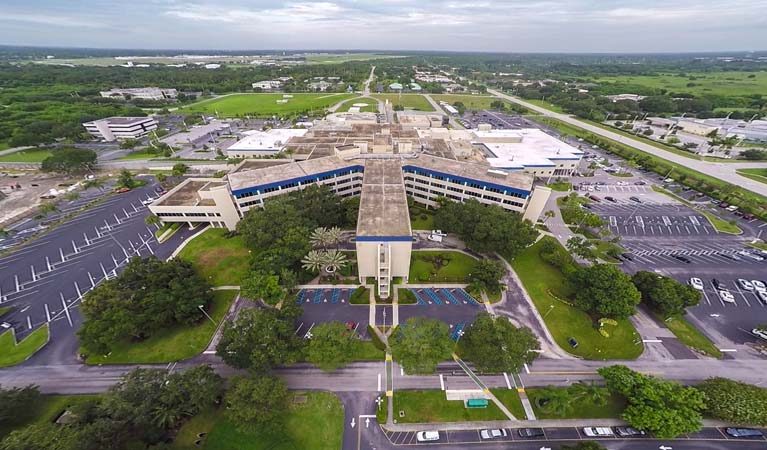
Marriage metaphors are getting a workout as Indian River Medical Center officials gear up for a final vote this coming Tuesday, Jan. 30, to pick one of four heathcare systems vying to take over Vero’s hospital – but, so far, no one has used the term ‘bridezilla’ in the two-month intensive courtship.
Hospital leaders intend to keep it that way after a key adviser warned that weary suitors could get cold feet.
Key to averting that outcome is the pace of the process, a timeframe so tight it had officials visiting eight hospitals in four days.
“Time is your enemy,” said Jupiter Advisory’s Jamie Burgdorfer, who has shepherded the two boards – IRMC and the County Hospital District – through the partnership process since August.
Last week there were some last-minute jitters about those boards having only two days to review the final proposals.
But once an accord is reached on a finalist this coming Tuesday – or later, if the boards can’t agree – the pace should slow, at least for the boards. IRMC officials will produce a non-binding letter of intent and the partner of choice will have exclusive rights to begin negotiations in earnest, typically for 90 or 120 days. That means a binding definitive agreement should be reached by late spring.
There also were concerns that only summaries and not the full proposals would be made public in advance of Tuesday’s decision.
In addition, there has been some late-to-the-game grumbling within the Indian River County Commission about self-insurance costs rising under new hospital management. And at least one commissioner – Bob Solari – wasn’t happy about the county missing out on some substantial sale proceeds, if, as expected, the hospital deal involves an amended lease, not an outright sale.
A 2012 law pushed by Gov. Rick Scott, who wants to get rid of public hospitals in Florida, would in the case of a hospital sale divide the proceeds evenly between the Hospital District, which uses tax money to underwrite medical care for the poor, and a fund for businesses involved in healthcare that would be administered by the County Commission.
If the IRMC property is leased by the new operator, no money will go to a county business development fund.
“The more that comes up with this, the worse it looks to me,” muttered Solari.
The financing details Solari seems surprised by have come up in multiple District meetings since last February, when the decision to partner was made. But until now, few if any county officials have shown much interest, despite county taxpayers owning the hospital campus, valued at more than $160 million.
Hospital District Board Chairman Marybeth Cunningham says neither Solari nor any other county official asked to read the potential partners’ preliminary proposals, received in November.
By contrast, the board of the hospital as well as the unpaid trustees of the Hospital District have been pouring hours and hours of time into the search. Both boards include former top executives of national and international firms, and many have multiple decades of experience in healthcare related fields.
Last week, trustees of the Hospital District Board learned from Burgdorfer that despite the intense interest shown in IRMC during the courtship, their four suitors – HCA, Orlando Health, Adventist Health System and Cleveland Clinic – may be tiring of the process.
With public scrutiny intensified under the Sunshine laws, an unusual circumstance in hospital deals, the health systems have been peppered with constant queries. “We’re calling them almost daily,” said Burgdorfer.
Trotted out for inspection by the press, the public and not one but two governing boards, the suitors have spent considerable time and money selling themselves to Vero’s hospital officials. Now they have had to put their best offers in writing, an arduous process with tedious detail, and not one they would relish publicly debating, Burgdorfer warned.
“I would say we are pushing them very hard. We are asking them to do a lot, to take a lot of time and care and spend a lot of money when they don’t know if they’re going to be your partner of choice,” said Burgdorfer. “They are somewhat weary and I think that’s just about right. But we want to be respectful of them.”
When on Thursday, District Trustee Tracey Zudans read aloud a motion to release the complete proposals to both the public and the boards upon receipt, Cunningham countered with an impassioned plea to leave the carefully constructed process in place, just the way advisers planned it.
Her fears were twofold. “The very worst that can happen to this county is that we do nothing,” she said. “We have a responsibility to our residents and that’s why we started this whole process because looking down the road, we knew we would be unable to sustain high quality healthcare for this community.”
Her second concern was that the process would be disrupted to the point that it “would cause suitors to walk away.”
“We are difficult to start with because we are a board of the hospital and a board of public District trustees, public officials that are elected,” Cunningham said, referring to the District’s required transparency under Sunshine laws.
“This county should be ecstatic, absolutely ecstatic, that we have four suitors, all very different, that we can talk about, debate and decide on. I would really hate to be in a position where we didn’t have a choice, where we couldn’t make those decisions, where they were made for us because people walked away.”
Just the day before, at another District meeting, Burgdorfer had mentioned another risk to the takeover deal.
“You are not the only hospital in Florida looking for a partner of choice,” he warned. “You are the only one doing it in the public eye.”
“The other companies are watching every move you make. It some cases, it’s eerie – they show up a week after we show up. That’s not good, but it is what it is. So far there hasn’t been any harm in that, but it’s a factor. So far the finalists are being constructive and positive … But it’s an issue you should be aware of.”
Last Monday night, Jan. 22, the final proposals of the four takeover candidates arrived in Juniper’s inbox. And there they remain, the object of intense scrutiny by Juniper – and no one else until the weekend.
District trustees and the hospital board of directors will first lay eyes on the proposals this coming Sunday, Jan. 28, two days ahead of the vote to pick a partner. Zudans wasn’t the only voice asking for more time; trustees Michael Weiss and Allen Jones also expressed concern.
But Burgdorfer disagreed. “Time is your enemy. I can’t emphasize that enough,” he cautioned. “Time is our enemy both in terms of dealing with the market and untoward things that can happen, and there are a lot of them.”
He urged the board instead to focus on impressions they have already formed over a year of research and reflection, including advice from nationally-recognized consultants plus multiple presentations from the suitors themselves. He said just as important as the terms in the proposals, which he expects to be similar to November’s preliminary proposals, will be their suitors’ identities, their financial strength, and their ability to be forward thinking in terms of the healthcare industry.
“You’ve been touching them, feeling them, reading about them and hearing from them for months,” he told the District Board. “You all have views of all of this, strong opinions in many cases, which is great. No one could in any remote sense criticize you for not being thorough enough, believe me.”
Zudans’ failed motion had asked that the proposals also be released to the public on receipt, though state law requires they become public only after a decision is reached, or 30 days after receipt, whichever comes first.
Instead, Juniper’s summaries of the proposals will be available to the public at Hospital District offices this coming Monday before the vote,
“The proposals are difficult for the suitors to write and they’re technical and full of minutiae,” said Burgdorfer. “But they are not particularly illuminating.
“It will take us 20 hours a day of reading them and calling the suitors trying to make sense of them, from the evening of Jan. 22 until we finish our report.”
That report – Juniper’s summaries – will be presented by Burgdorfer and his Juniper associates, Jordan Shields and Barry Sagraves, this coming Tuesday beginning at 9 a.m. That’s when the seven District trustees, 18 hospital board members and any interested citizens head to the huge new Intergenerational Center on Oslo Road for two to three hours of proposal review.
After that, the boards will meet separately starting at 1 p.m. to debate their final choice. With luck, the boards will agree on a single suitor. “We’ll go all night if we have to,” said Trustee Michael Weiss.
In fact, even under Sunshine law, they can break off and resume the next day if need be. And the day after that. Trustees were warned by Cunningham last week to “clear your calendars Wednesday, Thursday and Friday.”
With luck, the Intergenerational Center’s giant red front façade will not become another metaphor: the sudden stop the boards will come to if the two can’t reach consensus on the winner.
Asked if there was a plan for that eventuality, even Burgdorfer had to think for a bit. ‘We’re not sure,” he admitted. “We’ve been thinking about that. It’s very unusual to have two boards trying to make the same decision. But we welcome that challenge. It’s fun for us.”






